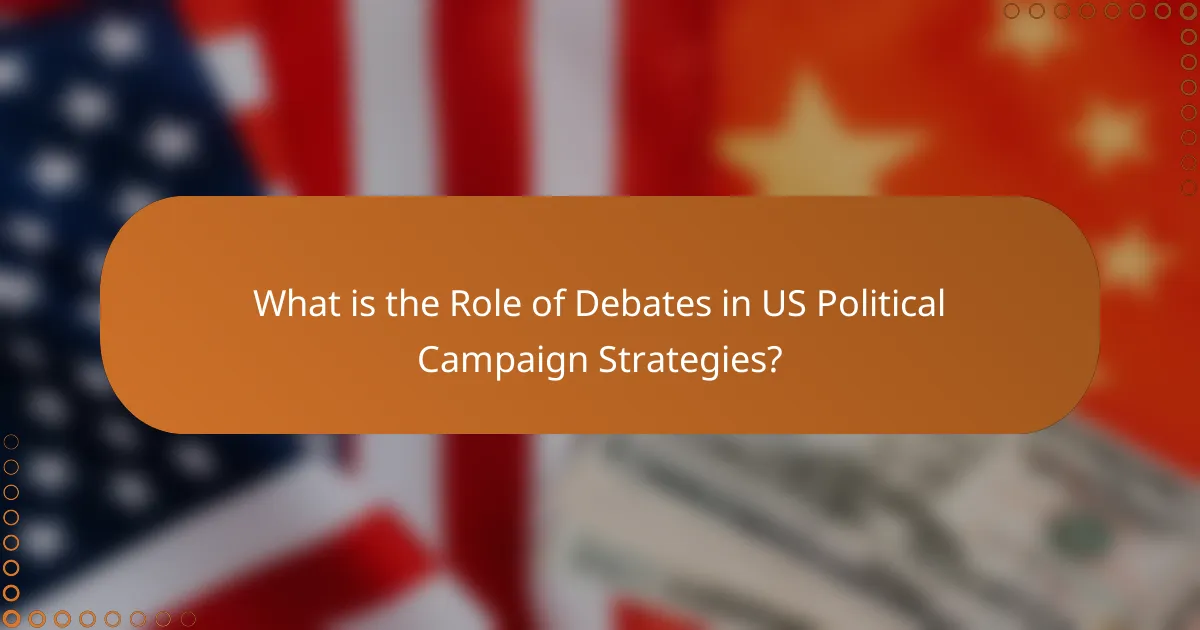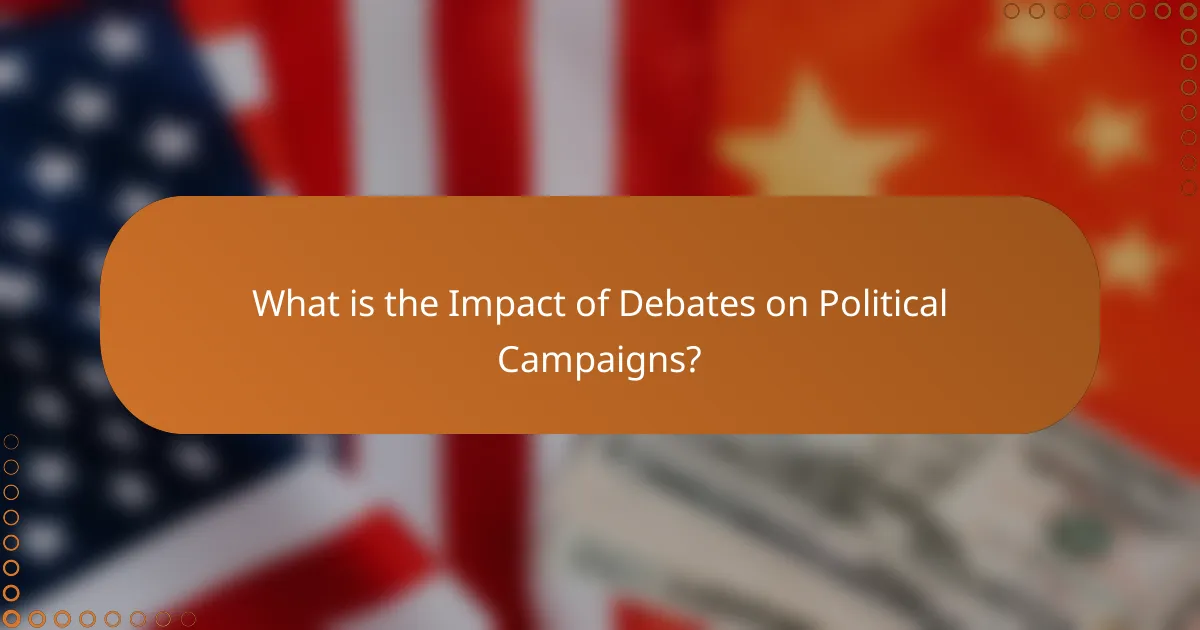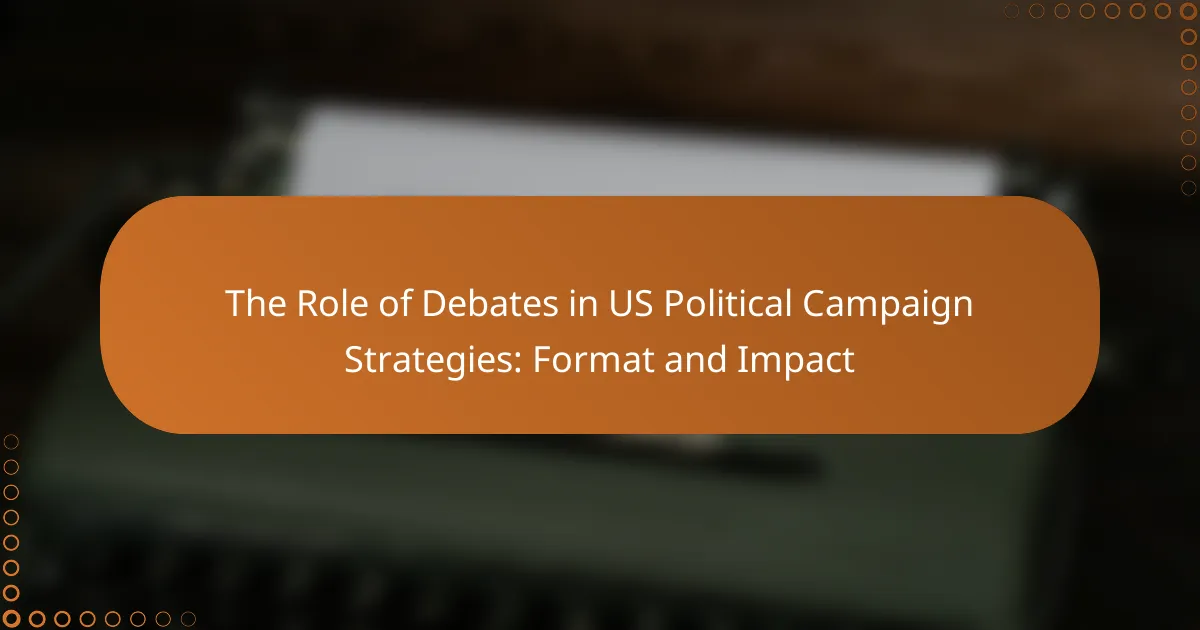Debates are a pivotal component of political campaign strategies in the United States, serving as platforms for candidates to articulate their policies and challenge their opponents. They attract substantial media attention, significantly shaping public perception and influencing voter decision-making. Historical examples, such as the 1960 Kennedy-Nixon debate, illustrate how debate performances can swing voter opinions and impact election outcomes. Candidates leverage debates to enhance their visibility, demonstrate communication skills, and build credibility, while effective performances can lead to increased support in polls. This article examines the format and impact of debates on electoral dynamics, highlighting their role in differentiating candidates and engaging voters.

What is the Role of Debates in US Political Campaign Strategies?
Debates play a crucial role in US political campaign strategies. They serve as platforms for candidates to present their policies and challenge opponents. Debates attract significant media attention, influencing public perception. They provide voters with a direct comparison of candidates’ positions. Historical data shows that performance in debates can swing voter opinions. For example, the 1960 Kennedy-Nixon debate is often cited for its impact on the election outcome. Candidates use debates to demonstrate their communication skills and leadership qualities. Effective debate performances can enhance a candidate’s credibility and appeal. Thus, debates are integral to shaping electoral dynamics in the US.
How do debates influence voter perceptions during campaigns?
Debates significantly influence voter perceptions during campaigns by shaping opinions and highlighting candidates’ strengths and weaknesses. They serve as a platform for candidates to present their policies and respond to opponents. This direct interaction allows voters to gauge candidates’ communication skills and authenticity. Research indicates that debates can sway undecided voters, impacting their final choices. For instance, a study by the Pew Research Center found that 59% of debate viewers reported that debates affected their views on candidates. Additionally, memorable moments or gaffes can dominate media coverage, further influencing public perception. Overall, debates play a crucial role in informing and persuading voters during election cycles.
What factors contribute to the effectiveness of debates in shaping opinions?
The effectiveness of debates in shaping opinions is influenced by several key factors. Firstly, the clarity of arguments presented by debaters significantly impacts audience perception. Clear and concise messages are more likely to resonate with viewers. Secondly, the credibility of the debaters plays a crucial role. Candidates with established reputations are more persuasive. Thirdly, audience engagement during debates can enhance effectiveness. Interactive formats that encourage viewer participation tend to foster stronger connections. Additionally, the media coverage following debates affects public opinion. Extensive analysis and commentary can amplify key messages. Lastly, emotional appeal in arguments can sway undecided voters. Research shows that emotional resonance often leads to stronger opinion formation.
How do candidates prepare for debates to maximize their impact?
Candidates prepare for debates by conducting extensive research and practicing their responses. They analyze their opponents’ previous performances and positions. Candidates also develop key messages to communicate effectively. Mock debates are often held to simulate the actual event. These practice sessions help refine delivery and timing. Candidates receive feedback from advisors to improve their performance. They also focus on body language and non-verbal communication. Strategic preparation enhances their ability to connect with the audience and convey their platform clearly.
Why are debates considered a critical component of campaign strategies?
Debates are considered a critical component of campaign strategies because they provide candidates a platform to present their views. This format allows for direct comparison between candidates on key issues. Voter engagement increases during debates, as they attract large audiences. According to the Commission on Presidential Debates, debates can significantly influence undecided voters. Historical data shows that candidates who perform well in debates often see a boost in poll numbers. Debates also help candidates clarify their positions and respond to opponents’ criticisms. This interaction can shape public perception and media narratives. Overall, debates play a vital role in shaping the electoral landscape.
What historical examples highlight the significance of debates in elections?
The significance of debates in elections is highlighted by several historical examples. The 1960 Kennedy-Nixon debate is often cited as a turning point in televised political debates. John F. Kennedy’s confident performance contrasted with Richard Nixon’s less polished appearance. This debate is credited with influencing public perception and voter behavior.
Another notable example is the 1984 Reagan-Mondale debate. Ronald Reagan’s effective use of humor and charm helped him to reinforce his popularity. His famous line, “I will not make age an issue,” showcased his ability to connect with voters.
The 2008 Obama-McCain debates also played a crucial role. Barack Obama’s calm demeanor and articulate responses helped him to solidify his lead in the polls. These debates demonstrated how effective communication can sway public opinion.
Each of these examples illustrates how debates can shape election outcomes. They serve as platforms for candidates to present their ideas and connect with voters. The impact of these debates extends beyond immediate voter decisions, influencing long-term political narratives.
How do debates compare to other campaign strategies in terms of effectiveness?
Debates are generally considered highly effective in political campaigns. They provide candidates with a platform to directly address voters. This face-to-face interaction fosters transparency and accountability. Research indicates that debates can significantly influence public opinion and voter decisions. For example, a study by the Pew Research Center found that 63% of viewers felt more informed after watching a debate. In contrast, other strategies like advertisements may not engage voters as deeply. Advertisements often lack the interactive element that debates provide. Thus, debates stand out as a vital component of campaign effectiveness.
What formats do political debates typically follow?
Political debates typically follow formats such as town hall, panel, and one-on-one debates. Town hall debates involve candidates interacting with voters directly. Panel debates feature multiple candidates answering questions from moderators or journalists. One-on-one debates focus on direct exchanges between two candidates. Each format has specific rules regarding time limits and question types. For instance, town hall debates often allow audience questions. The format chosen can influence voter perceptions and candidate performance. Historical examples show that formats can affect debate dynamics and outcomes significantly.
What are the different types of debate formats used in US politics?
The different types of debate formats used in US politics include town hall debates, traditional one-on-one debates, and panel debates. Town hall debates allow candidates to interact with voters directly. These debates typically feature questions from the audience. Traditional one-on-one debates involve two candidates discussing issues in a structured format. These debates often have timed responses and rebuttals. Panel debates include multiple candidates discussing various topics simultaneously. Each format serves to engage voters and clarify candidates’ positions. Historical examples include the Kennedy-Nixon debates in 1960, which were traditional one-on-one formats.
How does each format affect the candidates’ performance and audience engagement?
Debate formats significantly influence candidates’ performance and audience engagement. For instance, a town hall format encourages direct interaction with voters. This interaction can enhance a candidate’s relatability and perceived authenticity. In contrast, a traditional podium debate may lead to more structured responses, potentially limiting spontaneity. Candidates might perform better if they are adept at delivering concise, impactful statements in this format.
Research indicates that formats that allow for audience questions increase engagement. A study by the Pew Research Center found that 65% of viewers prefer debates with audience participation. Additionally, formats emphasizing cross-examination can lead to more dynamic exchanges. This dynamic can capture audience attention and increase retention of key messages.
Overall, the chosen debate format shapes both how candidates present themselves and how effectively they connect with the audience.

What is the Impact of Debates on Political Campaigns?
Debates significantly influence political campaigns by shaping public perception and voter decision-making. They provide candidates an opportunity to present their policies directly to the electorate. Performance in debates can sway undecided voters. For instance, a strong debate performance can lead to increased poll numbers. Conversely, a poor showing may result in decreased support. Historical examples include the 1960 Kennedy-Nixon debates, which showcased the impact of televised appearances on voter opinions. Additionally, debates often highlight candidates’ weaknesses and strengths, influencing media narratives. Overall, debates serve as critical platforms for candidates to engage with voters and differentiate themselves from opponents.
How do debates affect public opinion and media coverage?
Debates significantly influence public opinion and media coverage. They provide candidates a platform to present their views and engage with opponents. This visibility can sway undecided voters. According to a study by the Pew Research Center, debates can shift voter preferences by 10-15%. Media coverage often amplifies debate performances, highlighting key moments that resonate with the public. This coverage shapes narratives around candidates. A strong debate performance can lead to increased media attention and favorable coverage. Conversely, a poor performance may result in negative press. Overall, debates are pivotal in shaping both public perception and media discourse during campaigns.
What role does media play in amplifying debate outcomes?
Media significantly amplifies debate outcomes by shaping public perception and influencing voter behavior. It provides platforms for candidates to reach wider audiences. Through coverage, media highlights key moments and statements from debates. This can sway undecided voters and reinforce opinions among supporters. Research shows that media framing affects how debate performances are interpreted. For example, a study by the Pew Research Center found that post-debate media analysis can shift voter opinions significantly. Therefore, media acts as a powerful intermediary in the political debate landscape.
How do debates impact campaign funding and support?
Debates significantly influence campaign funding and support. They serve as platforms for candidates to showcase their policies and connect with voters. A strong performance can lead to increased donations and volunteer support. For instance, candidates who perform well in debates often see spikes in fundraising. According to a study by the Campaign Finance Institute, candidates can experience a 20% increase in donations following a successful debate. Additionally, debates can enhance a candidate’s visibility, attracting more media coverage and public interest. This heightened attention can translate into greater voter support and momentum. Therefore, debates play a crucial role in shaping the financial and grassroots backing of political campaigns.
What challenges do candidates face during debates?
Candidates face several challenges during debates. Time constraints limit their ability to fully articulate positions. The format often requires quick responses, which can lead to incomplete answers. Candidates must also navigate hostile questioning from moderators and opponents. Maintaining composure under pressure is critical but difficult. They face the challenge of addressing complex issues succinctly. Miscommunication can occur due to the fast-paced nature of debates. Additionally, candidates must counteract misinformation and misrepresentations. These factors can significantly impact their performance and voter perception.
How do unexpected moments in debates influence voter reactions?
Unexpected moments in debates can significantly sway voter reactions. These moments often create memorable impressions that resonate with viewers. They can include gaffes, emotional appeals, or surprise attacks. Such instances can shift public perception of candidates. For example, a well-timed rebuttal can enhance a candidate’s credibility. Conversely, a blunder may damage a candidate’s reputation. Research shows that 60% of voters recall specific debate moments that influenced their opinions. This highlights the power of unexpected occurrences in shaping electoral outcomes.
What strategies can candidates use to overcome debate challenges?
Candidates can use several strategies to overcome debate challenges. First, thorough preparation is essential. Candidates should research their opponents’ positions and anticipate counterarguments. Practicing responses to difficult questions enhances confidence. Additionally, candidates can develop clear, concise messaging to communicate their points effectively. Utilizing body language and eye contact can engage the audience and convey confidence. Furthermore, candidates should remain calm under pressure to maintain composure during heated exchanges. Engaging with the audience through relatable anecdotes can also strengthen their connection. Lastly, candidates should seek feedback from coaches and peers to refine their performance. These strategies collectively contribute to a more effective debate presence.

How to Leverage Debates in Political Campaign Strategies?
Political campaigns can leverage debates to enhance visibility and convey key messages. Candidates should prepare thoroughly by researching opponents’ positions. This allows them to anticipate arguments and formulate effective counterpoints. Engaging in debates builds credibility and showcases expertise. Effective communication skills can attract undecided voters. Campaigns can utilize debate performances in advertising to reinforce positive moments. Historical data shows that candidates who perform well in debates often see a boost in polls. For example, the 2008 presidential debates significantly impacted Barack Obama’s polling numbers.
What best practices should candidates follow when preparing for debates?
Candidates should research their opponents thoroughly before debates. Understanding opponents’ positions allows for effective counterarguments. Candidates must also prepare key talking points and practice them repeatedly. This ensures clarity and confidence during the debate. Additionally, candidates should anticipate questions and prepare responses in advance. This preparation can help manage unexpected topics. Practicing with a mock debate team can simulate real conditions. This approach builds familiarity with the debate format and pressure. Finally, reviewing past debates can provide insights into successful strategies and common pitfalls.
How can candidates effectively communicate their messages during debates?
Candidates can effectively communicate their messages during debates by using clear and concise language. They should focus on key points that resonate with their audience. Engaging storytelling can make their messages more relatable and memorable. Candidates must also practice active listening to address opponents’ points directly. Body language plays a crucial role in conveying confidence and sincerity. Utilizing facts and statistics can enhance credibility and support their arguments. Furthermore, candidates should anticipate questions and prepare thoughtful responses. This approach has been shown to improve audience engagement and understanding, as evidenced by successful debate performances in past elections.
What common pitfalls should candidates avoid in debate performances?
Candidates should avoid several common pitfalls in debate performances. One major pitfall is failing to prepare adequately. Preparation helps candidates understand their positions and anticipate counterarguments. Another pitfall is becoming overly aggressive or confrontational. This behavior can alienate voters and detract from the candidate’s message. Candidates should also avoid speaking in jargon or complex language. Clear communication is essential for audience understanding. Additionally, candidates should refrain from ignoring their opponents’ points. Engaging with opposing views demonstrates respect and critical thinking. Lastly, candidates should avoid excessive reliance on notes or scripts. This can hinder authenticity and connection with the audience.
What lessons can be learned from past debates to improve future strategies?
Past debates reveal critical lessons for enhancing future strategies. Candidates should prioritize clarity in their messaging. Clear communication resonates better with voters. Historical debates, such as the Kennedy-Nixon debates in 1960, show the impact of appearance and presentation. Kennedy’s confident demeanor helped him connect with the audience. Additionally, understanding audience demographics is vital. Tailoring messages to specific voter groups can increase engagement. Debates also highlight the importance of fact-checking. Misinformation can undermine credibility. Finally, practicing active listening during debates can foster better responses. Engaging with opponents’ points shows respect and enhances discourse. These lessons can effectively guide future debate strategies.
How can analyzing past debate performances inform current campaign tactics?
Analyzing past debate performances can significantly inform current campaign tactics. Campaign teams can identify successful strategies and weaknesses from previous debates. They can assess which arguments resonated with voters and which did not. This analysis allows for targeted messaging in future debates. Historical data shows that candidates who adapt their strategies based on past performances often improve their effectiveness. For example, the 2008 presidential debates highlighted the importance of effective rebuttals, which candidates later incorporated into their strategies. By understanding audience reactions, campaigns can tailor their approaches to engage voters more effectively.
What role does audience feedback play in shaping future debate strategies?
Audience feedback is crucial in shaping future debate strategies. It provides insights into voter preferences and perceptions. Candidates analyze feedback to understand which arguments resonate. This analysis helps refine messaging for future debates. For instance, successful debate performances often lead to adjustments in campaign strategies. Historical examples show that candidates who adapt based on audience reactions tend to improve their polling. Audience feedback also influences the choice of topics and questions in subsequent debates. By responding to voter concerns, candidates can enhance their relevance and connection with the electorate.
The main entity of this article is the role of debates in US political campaign strategies. The article examines how debates serve as critical platforms for candidates to present their policies, engage with opponents, and influence voter perceptions. It discusses the impact of debate formats on audience engagement, the factors contributing to effective debate performances, and historical examples that highlight their significance in shaping electoral outcomes. Additionally, the article explores strategies candidates can employ to prepare for debates, communicate effectively, and leverage debate performances to enhance their campaign visibility and support.
